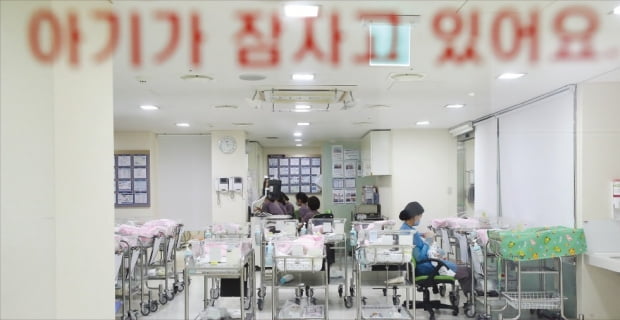
A newborn baby room in a hospital in Seoul that goes empty. Photo = Yonhap News
An analysis from the Bank of Korea that the impact of the novel coronavirus infection (Corona 19) will have a negative impact on domestic marriage and birth rates as the impact is concentrated in the 20s and 30s. There are concerns that the total fertility rate may be less than 0.72 in 2022 as even the pessimistic outlook estimated by the National Statistical Office is below.
On the 30th, researchers including Kim Min-sik, deputy chief of the macro-financial team at the BOK’s Bureau of Investigation, said in a report on’Checking the conditions of demographic change in the post corona era’.
The researchers determined that the direct population damage caused by Corona 19 will not be significant in Korea. This is because the infection rate or mortality rate is relatively low.
However, it was predicted that the shock of Corona 19 will have a negative effect on population change for a considerable period of time by intensifying the low marriage rate and low birth rate among young people. It was predicted that the phenomenon of the baby boom (a rapid rebound in fertility rates), which usually occurs after a large-scale disaster, will not be too large.
It is an analysis that Corona 19 will act toward canceling or postponing marriage and childbirth decisions by raising economic and psychological anxiety across society. The researchers said, “Corona 19 shock will have a negative effect on fertility rates mainly in terms of employment and income conditions, marital view and child view, and marital and childbirth age.”
In the first quarter of this year alone, the number of employed increased by 288,000 from a year ago, but after the corona 19 pandemic in March, it reversed to 314,000 in the third quarter. The number of marriages from March to September this year was 118,000, down more than 10% from the same period last year (134,000).
According to the National Health Insurance, the number of National Happiness Cards issued by pregnant women to support medical expenses was 137,000 from April to August, down 6.7% from the same period last year. The researchers interpreted that the impact on employment and income caused by the spread of Corona 19 would have been relatively concentrated among those in their 20s and 30s, which greatly affected the reduction of marriages and pregnancy.
The researchers said, “Amid the increasing proportion of single-person households, positive marriage views can be further reduced after Corona 19, due to the spread of non-face-to-face lifestyles and intensifying competitive environments.” Considering it, it will last at least two years until 2022.”
In particular, the National Statistical Office predicted that the total fertility rate in 2022 would drop to 0.72 in the low-level (pessimistic) estimation scenario in the special estimate of the future population last year, but the researchers thought it could be even lower.
The researchers said, “It should be noted that the low birthrate and aging population will become faster than expected and can become visible as a risk factor for future growth and financial sector.” It continues, and after 2045, when they reach the age of childbirth, it could lead to a second low birth rate.”
Reporter Jo Ara [email protected]
Ⓒ Hankyung.com prohibits unauthorized reproduction and redistribution
